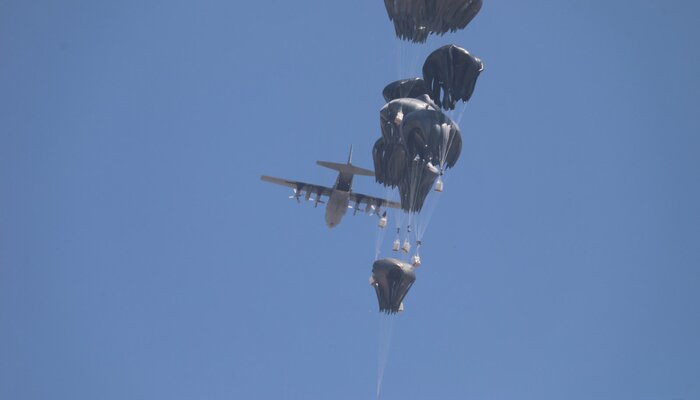In a strongly worded statement, the medical humanitarian organisation Médecins Sans Frontières (MSF), or Doctors Without Borders, has sharply criticised the use of airdrops to deliver humanitarian aid into the besieged Gaza Strip. As the humanitarian crisis continues to spiral out of control, MSF condemned the method as inefficient, performative, and potentially dangerous. The criticism underscores the growing frustration among aid agencies over the Israeli blockade, which continues to restrict land access for vital humanitarian assistance.
Airdrops Fail to Meet Urgent Needs
Jean Guy Vataux, MSF’s emergency coordinator currently stationed in Gaza, posted on social media platform X to express his dismay over the use of airdrops. “Using airdrops for the delivery of humanitarian aid is a futile initiative that smacks of cynicism,” he wrote, highlighting the symbolic nature of such efforts which often lack the scale and precision needed to address the dire needs of civilians on the ground.
While airdrops are sometimes used in emergencies when land access is impossible due to conflict or terrain, Vataux emphasized that this is not the case in Gaza. “The roads are there, the trucks are there, the food and medicine are there,” he said. “All that is needed is for Israeli authorities to decide to facilitate its arrival.” His comments point to a political impasse rather than a logistical one.
Vataux further explained that one truck can carry 20 tonnes of aid — far more than any single airdrop. In comparison, airdrops deliver much smaller quantities and often result in uneven distribution or failed deliveries due to navigational errors. In some instances, civilians have even been injured while scrambling to retrieve falling packages, a reminder that the method can cause more harm than good in densely populated war zones.
Jean Guy Vataux is our Emergency Coordinator in Gaza. He describes why airdrops of aid are not the most effective method for delivering aid.
“Using airdrops for the delivery of humanitarian aid is a futile initiative that smacks of cynicism. The roads are there, the trucks are… pic.twitter.com/PtAmz3khDW
— MSF International (@MSF) July 28, 2025
Political Roadblocks and Humanitarian Consequences
MSF’s comments come amid rising international scrutiny over Israel’s continued restrictions on land crossings into Gaza. Humanitarian convoys loaded with medical supplies, food, and water have waited for days or even weeks at border points. Aid agencies have repeatedly called for a ceasefire or at least the establishment of humanitarian corridors to allow uninterrupted aid delivery.
Read: Instagram AI Glitch Sparks Chaos in Friend Lists
Despite these calls, Israeli authorities have imposed tight controls over aid, citing security concerns. However, critics argue that these restrictions amount to collective punishment, exacerbating a crisis where more than 2.3 million people are now facing severe food and medicine shortages.
According to the United Nations, airdropped aid represents a mere fraction of the total assistance required to sustain Gaza’s civilian population. In recent months, the UN, World Food Programme, and Red Crescent have all echoed MSF’s concern, saying land routes are the only viable option to ensure large-scale, sustained aid delivery.
MSF, which has been operating in Gaza for decades, stressed the importance of immediate international pressure on Israel to lift the restrictions. The organisation called on the international community to stop relying on symbolic gestures and instead push for practical, long-term solutions.
Escalating Violence in the West Bank
As Gaza reels under blockade and bombing, Israeli forces continue to ramp up operations in the occupied West Bank. On the same day MSF issued its warning about airdrops, Israeli troops raided the village of Khirbet Ibziq, north of Tubas.
According to local human rights groups, soldiers stormed homes and questioned residents, while expressing hostility toward international solidarity activists who were present in the area. The northern Jordan Valley region, including Khirbet Ibziq, has seen a sharp increase in military activity and settler violence in recent months. These incursions are often accompanied by destruction of property, intimidation of civilians, and the displacement of Palestinian families.
While international attention remains focused on the bombardment of Gaza, the situation in the West Bank continues to deteriorate with little accountability. Humanitarian agencies, including MSF, have warned that unchecked Israeli military activity across Palestinian territories is contributing to a broader humanitarian and human rights disaster.
Read more: Shamoon Ismail Hints at Big Life Change in Intimate Reveal
Airdrops Are No Substitute for Action
MSF’s latest remarks highlight a disturbing trend of symbolic aid efforts being used in place of real policy shifts. The focus keyphrase airdrops represents more than a technical discussion—it reflects a global failure to address Gaza’s catastrophe with urgency and sincerity.
As Gaza’s health system collapses, its people starve, and families remain under fire, MSF’s message is clear: replace spectacle with substance. Open the borders. Let the trucks in. Only through land-based aid delivery, sustained diplomacy, and adherence to humanitarian law can the suffering of millions be alleviated. Anything less is not just inadequate—it is dangerous.
Follow us on Instagram, YouTube, Facebook,, X and TikTok for latest updates
